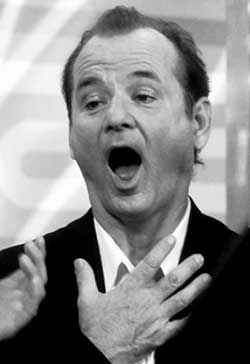BILL MURRAY HAS never been more like Bill Murray than he is in Lost in Translation (which opens Fri., Sept. 12, at Seven Gables and other theaters), and Scarlett Johansson has never been more like Sofia Coppola. Writer-director Coppola spins her angel-hair fantasia around Murray’s sturdy persona: a star repelled by stardom; a spiritual seeker, heroic ironist, and lounge singer extraordinaire. Ostensibly he’s Bob Harris, a matinee idol despising himself for taking $2 million to do some quickie whiskey ads in Tokyo, but really he’s only, always, Bill Murray. Who else could craft such an immortal deadpan reaction when the ad’s crazy director instructs him to sip whiskey like the “Lat Pack” and “007 Loger Moore”? Back at his high-rise hotel, a malevolently incomprehensible treadmill spins out of control, provoking classic Murray pratfalls.
But Coppola is out to plumb Murray’s depths, not just milk him for yocks. Bob’s unseen wife is emotionally distant, conveying via fax and wrong-time-zone phone calls that she’s more interested in their home’s decor than having him back home. So when he catches the appealingly needy eye of Charlotte (Johansson) and notices that she, too, is reading A Soul’s Search: Finding Your True Calling, a peculiar romance ignites.
Charlotte is tagging along with her husband (Giovanni Ribisi), a shallow photographer said to resemble Coppola’s estranged husband, Spike Jonze. Johansson certainly resembles Coppola: She captures her wispy willfulness, her urge to regard aesthetics in ethical termsshe even wears Coppola’s clothes. She’s a drifting wraith of sensitivity and vague, exquisite taste.
Together, Charlotte and Bob tour through teeming streets in an otherworldly city. Above them, Blade Runner-like, a giant video brontosaurus strides across the face of a skyscraper. The two even flirt via karaoke: Bob croons Roxy Music’s “More Than This,” and Charlotte replies by quoting the Pretenders, keening like Chrissie Hynde. Will they ditch their respective spouses for each other? Instead of a plot, the movie has an obsessive question on its mind: How does one connect with another human while mired in a different culture and the still more alienating culture of showbiz? At times it plays like Coppola imitating Sylvia Plath imitating J.D. Salinger.
Coppola makes two-thirds of a masterpiece from this delicate material. She wonderfully renders the ethereal dreamscape of Tokyo as glimpsed by a sleep-deprived visitor, while Murray and Johansson strike sweet, strange sparks, emancipated from clich餠clinches. It’s a fine, noncopulatory romance. But like a short story stretched out to novel length without benefit of plot complications, character development, or articulated themes, it dissipates its force. Coppola hasn’t figured out how to convey languor without longeuers.
Bob’s mad Japanese director says, “Slower and more intensity!” This may be an in-joke jab at George Lucas, who famously instructed his Star Wars cast to play it “faster and more intense!” Sofia Coppola has intensity to spare, but her go-slow dramaturgy lacks what Lucas had: a specific narrative goal to organize and galvanize events. Despite her gifts as a director, her stories have no sense of direction.








